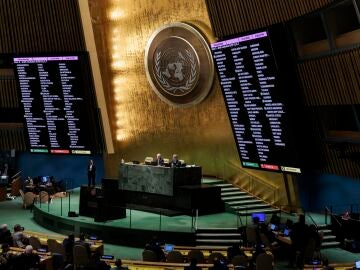
The resolution of the General Assembly which calls for the “cessation of hostilities” in Ukraine and the withdrawal of Russian troops has reaped today a total of 141 votes in favor and seven against, while 32 countries abstained. The resolution was eventually co-sponsored by 75 countries, including all of the European Union, United States and several Latin American (Chile, Ecuador, Dominican Republic and Uruguay).
The result has been very similar to the votes last March and last October, also to end the war in Ukraine, and the countries that today voted against were – as then – Russia’s staunchest allies in the world: Belarus, North Korea, Eritrea, Mali, Nicaragua and Syria. Among the abstainers were China, India, South Africa, Cuba and a majority of African countries.
During the two days of interventions, many countries have launched repeated calls for peace in a generic way and the opening of negotiations, but the High Representative for European foreign policy, Josep Borrell, said that these appeals were the result of “naivete”, as he insisted that “Russia has not sent the slightest signal that it wants peace.” The Europeans, who promoted the resolution along with Ukraine from the beginning, had warned that abstention would not work because it would be immediately noted by Russia as a position in its favor, As the Spanish Foreign Minister said yesterday, Jose Manuel Albares.
The central point of the resolution is the fifth, which calls on Russia for “an immediate, complete and unconditional withdrawal of all its military forces from Ukrainian territory within its internationally recognized borders”, and then calls for a “cease-fire”. Although it also asks support “diplomatic efforts to achieve global peacejust and lasting in Ukraine”, also stresses the need for “be accountable for the most serious crimes under international law (…) and that they be persecuted at the national and international level”, a phrase that has been criticized by several countries.
The resolution came from Ukraine and it was immediately sponsored by the European Union, and 75 countries ended up joining it. Initially included the so-called “Zelensky peace plan” but it was withdrawn in favor of more diplomatic or less “anti-Russian” terms, according to what European sources explained to EFE. Today’s result was very close to that of last October 12, in the vote for the Assembly after the annexation referendums of four Ukrainian provinces: then 143 countries voted against the annexation, five did so against (Russia, Belarus, North Korea, Nicaragua and Syria) and 38 abstained, most of them African or Asian. That result was even larger than the one achieved on March 24, a month after the invasion: that resolution that demanded “an immediate cessation of hostilities”was supported by 140 countries, five voted against (Russia, Belarus, Eritrea, North Korea and Syria) and 38 abstentions.
Recourse to the General Assembly (although its resolutions are symbolic) has become common since the beginning of the war against the ineffectiveness of the Security Council, weighed down by Russia’s right to veto, which has prevented the approval of a single resolution (which in its case are mandatory).
Source: Lasexta
Ricardo is a renowned author and journalist, known for his exceptional writing on top-news stories. He currently works as a writer at the 247 News Agency, where he is known for his ability to deliver breaking news and insightful analysis on the most pressing issues of the day.











